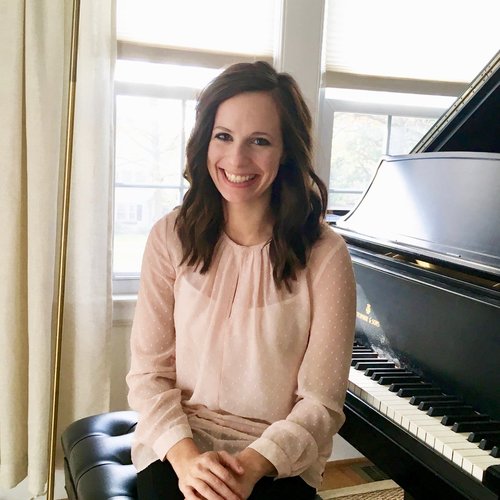 by Ashley Danyew
by Ashley Danyew
It's one the greatest musical skills you can help your choir develop: singing and reading music for themselves with musical understanding.
But how do you teach it? And how do you develop it in the limited time you have with your choir each week? Here are four practical strategies you can use to help your choir improve their sight-reading skills this year:
Here are four practical strategies you can use to help your choir improve their sight-reading skills this year:
1. Make it a regular practice.
The best way to develop a new skill—in any field—is by practicing. It’s how chefs develop their signature recipes, painters develop their technique, writers develop their unique voice. It’s how you learn a new language or how to ride a bike or play an instrument.
To become a better sight-reader, you must sight-read regularly.
This means making time in your rehearsal plan each week to sight-read something new as a group. The “new” is important because sight-reading only counts the first time you sing through something. After that, it’s simply music-reading.
Sight-reading exercises don’t have to be long or complicated; in fact, consider doing something simple and accessible, at first - a short, 8-measure melody that your choir can sing in unison. This is a quick way to assess where everyone is in the process and how you can best support them and challenge them in the weeks to come.
Once they can consistently sing the unison exercises accurately and musically, introduce 2- and 3-part exercises, eventually moving to 4-part chorales or unfamiliar hymns.
The important thing is to make sight-reading a regular practice for your choir.
2. Review the rhythm separately.
When reading music, it’s important to recognize two primary elements: rhythm and tonality. When sight-reading, review the rhythm separately by chanting or counting before singing. This will help your choir members learn to establish meter and give them an opportunity to review any challenging rhythm patterns before adding in notes and phrasing and dynamics.
You can also ask your choir to look through the example silently and think the rhythm to themselves, which brings me to my next point.
3. Practice silently before singing it out loud.
Do you remember when you first learned how to read a book silently? To hear the words in your head without any sound being present? This is a valuable skill in music-reading, as well.
Give your choir an opportunity to practice the exercise silently before singing it out loud. Establish tonality by playing the tonic chord (or I-IV-I-V7-I chord sequence in the given key) and the starting note, and establish meter by counting off in a steady tempo.
4. Always sing it again.
This is a big one.
Repetition is how we learn, how we remember, how we make sense of our experiences. Even if your choir sang it perfectly on the first try, always take the repeat (even if there’s not one marked in the score).
The goal when sight-reading is not to sing with perfect rhythmic and tonal accuracy; it’s to sing with musical understanding and expression.
Giving them an opportunity to sing it again will solidify that musical understanding and help them sing with greater confidence (and expression!).
After singing it for a second time, ask them to reflect on how it went. What did they notice or observe about the exercise? What did they do well? What was challenging for them?
This is an important part of the learning process—reflecting on what just happened—and again, it's a great way for you to assess their understanding and awareness.
How do you help your choir develop their sight-reading skills? What strategies have you found most effective? -- For more tips and tricks for choir directors, church musicians and music educators, check out www.ashleydanyew.com.
-- For more tips and tricks for choir directors, church musicians and music educators, check out www.ashleydanyew.com.










